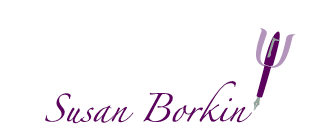When Your Heart Speaks, Take Good Notes: The Healing Power of Writing
This chapter is excerpted from When Your Heart Speaks, Take Good Notes: The Healing Power of Writing by Susan Borkin.
-
-
To go directly to the exercise on Writing With Intention, click here.
To go directly to the exercise on Writing With Awareness, click here.

Chapter Fifteen: The Tao of Writing
When the student is ready, the teacher will appear.
--Chinese proverb
The Tao is a Chinese term that refers to the way that life, like water, can be gentle and yielding, if we let it flow. On its own, water will flow effortlessly, without a struggle, knowing just where it needs to go. And so it is with writing. When we let ourselves flow gently, flow without effort, without contention, without struggling with our own internal editor, our own whiny little critic, our writing is more likely to go just where it needs to go.
This book is designed to teach the use of personal writing to heal. By its nature, it is writing without contention. That means nothing you write in the course of writing to heal will be criticized. Paradoxically, the more formless personal writing is, the more likely it is to flow. Its most important rule is that there are no rules. This, too, is the Tao of Writing.
Earlier I talked about resistance and the intense desire most of us have to avoiding writing. Generally, however, when we think of writing, we are thinking of writing for other people's eyes. But writing to heal is different. In writing to heal we are interested in the process, not the outcome. No one else need ever see -- or criticize -- what you write.
When we use writing as a tool for awareness and healing, we find the outcome, the written word, to be useful, but frequently not as useful as the process of writing itself. Personal writing of this nature is intentional writing. Its deepest intention is to heal. Like water flowing, effortlessly finding its way around and through obstacles, the healing power of writing uses words effortlessly to to transform pain, confusion and internal chaos. Listen to the words of Gabriel Rico in Pain and Possibility, "Writing helps to direct your pain into a constructive act...thus transforming it.”
In writing to heal, words become vehicles, vessels for experience, containers to hold awareness. To use writing to heal, to really listen to your heart speak and take good notes, it is therefore essential to be in touch as deeply as possible, as much as the limits of your awareness will allow.
To open the passage for healing words to flow, to write more deeply, you need to feel more deeply. Healing energy becomes increasingly available the closer you get to your own feelings The closer you are to the essential nature of your feelings, the closer you are to the bone. Connecting at this level requires quiet, what I think of sometimes as quietude, that state of grace accompanying silence. Writes Jean Shinoda Bolen, M.D., in Close to the Bone, “ For soul to be heard, the mind must be still. Then thoughts and feelings can arise as if from some deep well within us."
Honoring the Need to Write
Years ago I was talking to a woman I knew who ran each day with remarkable regularity. Being relatively unathletic myself, I asked her if she ran in the rain, feeling an involuntary chill as I imagine cold sheets of water drenching my neck and shoulders, and squishing in my gym shoes.
“Do you think we like to run in the rain?” she asked me. “We run because we need to run, and it happens to be raining, so we run anyway.”
A few years later, I heard essentially the same thing from another runner. I had gone away for the weekend with a group of friends. We were staying in a cabin in beautiful Big Sur, California. One of the women had got up and had run six miles before the rest of our group was even fully awake. I asked her how she could just get up and run like that.
“I don’t know, she said, “I just don’t feel good unless I run.”
Later in the day, overlooking the ocean at Nepenthe, a restaurant famous for its breathtaking ocean view, I said to her, “Hold on, I have to go the car and get my journal. I feel a poem coming on.”
“How can you just write like that?” she asked. “I don’t know”
I said. “I just don’t feel good unless I write.”
It’s true. And the people in my life know it. My husband said to me one day in utter frustration over one of my domestic foibles like avoiding unloading the dishwasher, “You’ll drop everything to write. You put writing above everything.” I remember thinking this was fairly observant of him, and it took me a long time to realize he didn’t mean it as a compliment. How could I ask a non-writer to understand that my passion for writing was like the runner’s passion for running? How could I explain to someone not taken with the written word my compulsive need to write, a desire so strong that like the runner running even in the rain, I need to write like I need to breathe.
To me writing to heal is soul writing, writing without restriction, separate from the business aspects of writing and editing, separate from any purpose other than the intention to be as honest, as clear and as deeply connected to your soul as possible. “Don’t ‘make’ your mind do anything,” writes Natalie Goldberg in Writing Down the Bones. “Simply step out of the way and record your thoughts as they roll through you.”
This is the Tao of Writing in its purest form, writing without restriction, writing without editing, writing without judgment, giving yourself the uninterrupted freedom to put pen to paper or fingers to keyboard without critical thought or analysis. The Tao of Writing is experiencing your essence as it presents itself to you, and then recording it.
Writing With Intention
When you combine your unedited heartfelt words with the clear intention to heal, magic happens. Writing with intention is writing with a kind of beaming attention to the task at hand. It is going deeply inside, noticing and recording, and dropping deeply inside again. Over and over, dropping, deepening, recording. Over and over, becoming quiet, waiting, listening, recording.
As you work this way with writing, you will find that the healing voice you seek is not nearly as deeply hidden or as inaccessible as you imagined. Give it time and quiet, and it will be there.
Write Now! Exercise: Writing With Intention
1. Become quiet for few minutes. 2. Ask yourself, “What in my life needs healing at this moment?” 3. Remain quiet. Wait. Notice your body. Notice your thoughts. Listen to the words of your heart. Hear the voice of your soul. 4. When you are ready, make notes about what you have seen, felt and heard.
The Way of Noticing
The way of the Tao as applied to writing is a way of noticing the world around you. Noticing without contention, noticing without judgment. The Tao of Writing is watching, observing, noticing.
Have you ever spent time with a photographer? They talk about color values, the angle of light and framing their shots. Photographers view the world through a camera lens. Artists, too, view the world through colors, shapes and space. Writers view the world through words. But all of us, whether or not we view ourselves as artists or writers, can begin to view the world in a much more aware, observant way. We can begin to notice the details of our lives, the details of our physical space, the details of our bodies, the feel of the energy around us. We can begin to notice the world by watching more, paying more attention to our feelings, our physical sensations. We can pay more attention to our relationships and the relationships around us. We can pay more attention to relationships not just to other people, but to our physical environment. The Tao of Writing is noticing richly, fully and with quiet aliveness.
Writing makes us more alive, more conscious.
Brenda Ueland, author of If You Want to Write, once said, “I learned that you should feel when writing, not like Lord Byron on a mountain top, but like a child stringing beads in kindergarten---happy, absorbed and quietly putting one bead on after another.”
Wrote Anne Morrow Lindbergh, best known for A Gift From the Sea, "I must write it all out at any cost. Writing is thinking. It is more than living, for it is being conscious of living."
A client of mine said to me once, “I have to write, I don’t need to have it be a bestseller.“ Her remark touched me and reminded me of the words of freelance writer George Carousso, “It doesn’t matter a comma in eternity whether or not you have been published. Writing is something you were born with. It’s yours forever. Like a birthmark. It stimulated the dim, forgotten fantasies in your crib, the daydreams of your awareness and growth.”
Write Now! Exercise: Writing With Awareness
Take just a few minutes now. As you have done for several of the other writing exercises, allow yourself to become quiet.
Notice what you feel as you sit quietly. Notice the physical space around you. Write down what you notice.
Notice your thoughts and your feelings. Write down what you notice.
In your mind’s eye, notice yourself doing this exercise. Notice your judgments, notice your reactions, notice your thoughts and your feelings.
Notice how difficult it is to do nothing but be aware and observe!
* * *
The desire to write is a longing to make what is inside of us concrete and visible. The process of writing brings us back to ourselves. The more conscious we become of noticing and of what we are noticing, the more we begin to notice. In paying attention, and then recording, we create a shift in our perceptions. Sometimes swiftly, sometimes slowly, the alchemy of writing helps to reorder what has become chaotic, lost, broken.
The Tao of Writing as we have explored it in this chapter invites us to stay conscious and mindful. It invites us to live our lives fully and deeply, noticing in rich and colorful detail what is inside of us and around us. In the next chapter, I’ll make concrete suggestions for living the writing life through the development of a mindfulness writing practice, a practice that is all about noticing.
return to top
|




